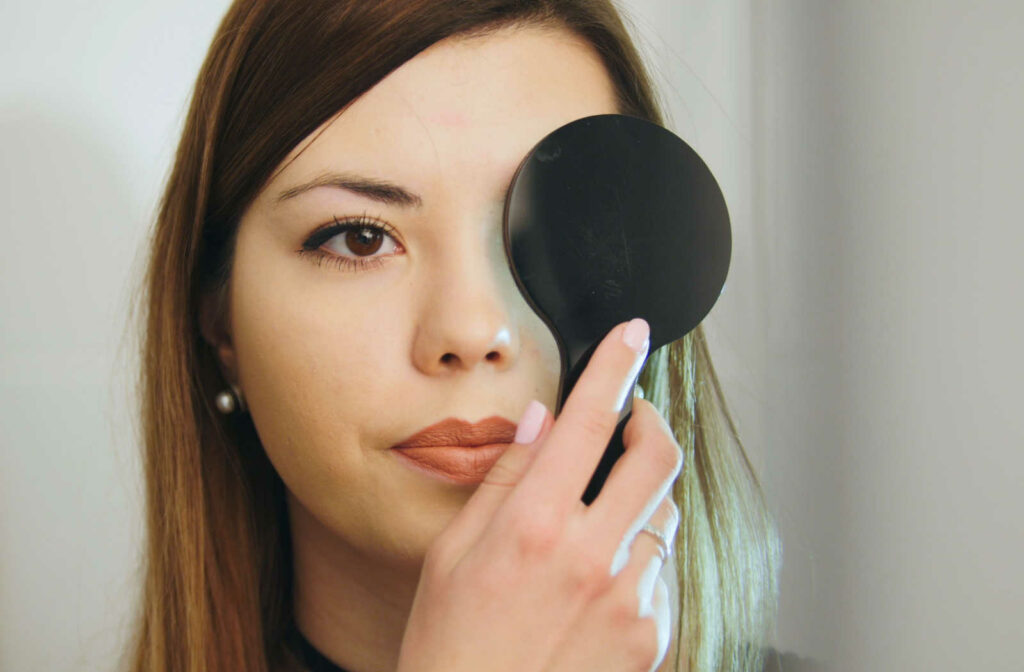There’s a misconception that vision therapy is eye exercise. While this is partly true, it’s not only eye exercises. Vision therapy is like physical therapy for your eyes that can improve visual skills such as eye movement control, depth perception, and focus.
Both adults and children can benefit from vision therapy. But can you do it at home?
A tailored vision therapy treatment program may include in-office sessions with your optometrist and at-home maintenance therapy.
What is Vision Therapy?
Vision therapy is a series of exercises and activities to help improve visual skills. Therapy sessions occur in a clinical setting under the guidance of a trained optometrist.
Vision therapy helps address eye tracking issues, retrain poor visual behaviour, strengthen eye muscles, and change how your brain interprets what you see, allowing you to perform daily activities more easily and efficiently.
Vision therapy can help with the following activities and conditions in adults and children:
- Reading
- Writing
- Catching a ball
- Playing sports
- Acquired brain injury
- Concussion
- Amblyopia (lazy eye)
- Strabismus (crossed eye)
- Convergence insufficiency (inability of both eyes to focus)
- Eye strain
- Headaches
One example of vision therapy could be treating a child with a lazy eye (loss of vision in one eye). They may require glasses first. An eye doctor may then put a patch over the good eye, so the child will have to rely more on the lazy eye. Together with other exercises, this forces the child’s brain to see with the weaker eye, thus helping to restore vision.
Post-Concussion Vision Therapy
After a concussion, you may experience lingering visual symptoms that can indicate the brain and eyes aren’t communicating effectively. Symptoms of a concussion can include the following:
- Blurred vision
- Double vision
- Light sensitivity
- Headaches
- Eye fatigue
- Difficulty concentrating
- Dizziness
Vision rehabilitation with a personalized treatment plan after a concussion can help improve your vision by rebuilding the connection between the brain and eyes, restoring balance, and assisting your cognitive function.
Can You Do Vision Therapy at Home?
The short answer is yes, you can do vision therapy at home. However, vision therapy is a specialized form of therapy that requires the guidance and expertise of a trained professional.
While it’s possible to find vision therapy exercises online or in books, it’s essential to understand that these exercises may not be appropriate for everyone, and attempting them without the direction of your eye doctor is not recommended. Every individual’s visual needs are unique, and vision therapy is not a one-size-fits-all approach.
Specifically designed vision therapy treatment programs can meet and address an individual’s needs. The first step is typically a complete vision therapy diagnostic assessment to determine visual issues.
Vision therapy is not just about doing exercises. It may also involve using specialized equipment and tools. These tools can provide specific visual stimuli, which is critical to the success of the therapy. And without access to them, it can be challenging to achieve the desired results.
Because there is no standardized set of exercises or activities, treatment plans look different for everyone. Vision therapy can include combining in-office sessions and at-home maintenance programs where your eye doctor can provide guidance and feedback throughout the therapy process to help you perform them correctly and safely.
For example, after 10 sessions, your eye doctor may perform a progress check to measure improvement and modify your treatment. Modifications can include more sessions or a transition to at-home maintenance therapy.

Virtual Reality Vision Therapy
Vision therapy can also include virtual reality treatment solutions. The Optics Trainer tool uses gameplay and activities to improve the following visual skills:
- Hand-eye coordination
- Reaction time
- Visual memory
- Peripheral awareness
- Sports vision
- Depth perception
The RightEye vision system is a non-invasive diagnostic test that allows your eye doctor to test, record, analyze, and report eye movement patterns with great detail to help identify and address binocular vision disorders.
Benefits of Professional Vision Therapy
While it may be tempting to try and save money by doing vision therapy at home, there are several benefits to working with a trained professional:
- Personalized therapy is specific to your needs and more effective and efficient than generic exercises.
- Professional feedback and guidance throughout the therapy process.
- Use of specialized equipment and tools not available to the general public that are critical to the success of the therapy.
- Progress evaluation to determine the effectiveness and adjust the therapy plan as needed.
Invested in Your Eyesight
While it’s possible to do vision therapy at home, it’s not advisable to attempt it without the guidance of a trained professional. Vision therapy is a highly specialized form of therapy that requires personalization, specialized equipment, and modification from your eye doctor to achieve the desired results.
Book an appointment with Avenue Optometry & Vision Therapy to learn how you can benefit from vision therapy.




